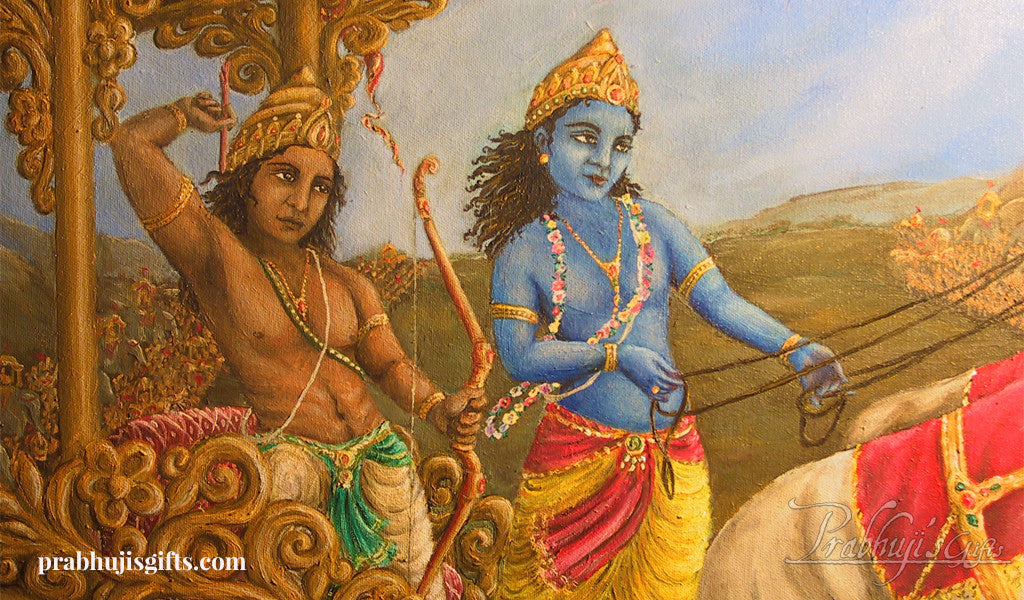The Sanskrit word for meditation is dhyana and is defined by the father of yoga, Patanjali Maharishi, in his Yoga Sutras as the “uninterrupted flow of attention towards an object.” (Yoga Sutras, Vibhuji Pada, 2)
The Bhagavad Gita
The Bhagavad Gita is probably the best known Hindu scripture. The meaning of its name is “the song of God” as it emanated from the lips of no other than Lord Krishna Himself, to his disciple Arjuna. Prabhuji, a spiritual master and founder of the Bhaktivedanta Mission in New York, once wrote that the Bhagavad Gita was not spoken only to Arjuna in a specific time on a battlefield in ancient India but to all humanity at all times and in all places. And so its fountain of wisdom, being so universal, crossed the borders of India long ago, allowing thinkers, philosophers, scholars and religious beings from various nations, cultures and eras to satisfy their thirst. We will reflect on the topic of meditation in the light of this great book. But before that, let’s speak a little about you.
Does this sound like you?
Let me guess; does your mind jump here and there throughout the day without giving you a break? Desires, aversions, aspirations, frustrations, goals, disappointments, hopes, regrets, plans, nostalgia, dreams, ambition, determination and confusion; they all flow in and out without waiting in line or asking for permission. Without any kind of organization, they all show up at once, competing among themselves, demanding your attention, distracting your peace.
And so you hear about this idea of meditation, this “uninterrupted flow of attention,” and immediately feel an attraction to be in that state, sensing the peace and happiness it will bring you, just as the Vedantic masters have promised repetitively. The thought of retiring from the noisy world, your daily routine, stressful job, perhaps a complicated relationship, maybe financial hardship, or even some kind of physical challenge even for just a brief moment, is totally alluring. Now all that is left is to seek and quickly find the method, the technique, the magic trick that should immediately bring about this state seems better than your sweetest dreams.
However, soon enough you will discover that it is not as simple as you might have hoped.
The first step to set the stage for the ideal conditions is the easiest: play calming music, light incense, sit cross-legged and close your eyes. The hardest part quickly follows when you attempt to harness your dispersed attention and tumultuous mind to flow in a focus and uninterrupted manner.
Universal phenomenon
By now you may have been convinced that, while most human beings enter into the meditative state in a split second, you are a special case. Your mind is too restless; this magic does not happen, for one reason or another. It just doesn’t work for you.
I suppose there is a chance that you could be right about being a special case, except that the state of meditation actually requires a bit more preparation. There is no quick fix, no magic pill.
The good news is that you are not alone with this problem.
Vedic literature reveals that it is not your mind that is restless but that the mind is restless, in the same way that you are not the only one with a false ego. As Prabhuji once said: “The false ego is a universal phenomenon.”
Krishna says in the Bhagavad Gita 2.67: “As a strong wind sweeps away a boat on the water, even one of the roaming senses on which the mind focuses can carry away a man's intelligence.”
And Arjuna himself recognized this in 6.34: “For the mind is restless, turbulent, obstinate and very strong, O Krishna, and to subdue it, I think, is more difficult than controlling the wind.”
Deeper into the Gita…
This point of attempting to meditate only to experience the frustration of failing might seem to us like nothing more than a lack of luck and a waste of time, but it is actually a great starting point to dig deeper into the meaning of meditation in particular and spiritual life in general. To clarify why and how, we will take a short tour, as promised, into the Bhagavad Gita, in which we will discover some treasures.
We may see ourselves in Arjuna the disciple, in the beginning of the Gita when he said he wanted to be spiritual, noble, happy and peaceful, but yet he couldn’t. His mind overpowered him with desires, making him confused and helpless.
We will also encounter Lord Krishna, God, who personally guided Arjuna while he was in this state, imparting unto him divine wisdom and helping him walk from darkness to light, from chaos to clarity, from misery to bliss.
The story of Arjuna can teach us a lot about meditation. Let’s take a closer look at it.
The story of Arjuna
Arjuna was a warrior (Kshatriya) in India and his duty as such was to fight when the cause was just. His elder brother, Prince Yudhishtire, was entitled to rule the Hastinapur kingdom. Due to the evil deeds of their cousin, Duryudhana, who was extremely egoistic, mean and greedy, Yudhishtira was not given his right to sit on the throne and was even deprived of all other rights and possessions. Yudhishtira was the most righteous, compassionate and humble of all men, while Duryodhana was vicious and sinful. Moreover the Pandavas (this is the name for the five sons of King Pandu, including Yudhishtira and Arjuna) did all that they could to prevent a battle and find a peaceful agreement but Duryodhana would not cooperate. More important than all of the above, after all efforts for peace failed, fighting became the will of Krishna. There was no choice left but to go to war.
Arjuna knew well his duty to protect the dharma and he went to war without question. However, as he stood in the battlefield and saw the enemy army consisted of his relatives and teachers, a great emotional weakness overpowered him, causing fear, confusion and forgetfulness of his duty.
Krishna, his Lord and master who served as his charioteer, watched Arjuna in that state and guided him, with love and wisdom, out of it. Arjuna wanted to retire, to escape from the difficult situation, believing that it might alleviate his distress and bring him peace. Krishna, however, taught Arjuna that escaping from life’s difficulties will by no means bring one peace. His path to that peace is to work.
Work?
Yes, and not only, but work hard! And if that is not enough, his specific duty was to fight in a battle and kill his friends and relatives. This and this alone was his personal path towards meditation.
It’s not all about technique
In the Gita, 5.27-28, we get a description of the yogi in meditation.
“Shutting out all external sense objects, keeping the eyes and vision concentrated between the two eyebrows, suspending the inward and outward breaths within the nostrils, and thus controlling the mind, senses and intelligence, the transcendentalist aiming at liberation becomes free from desire, fear and anger. One who is always in this state is certainly liberated.”
At first glance and if taken out of context, it seems that the yogi does exactly what we try to do when meditating, only that he succeeds to get to the liberated state. But if we take a closer look and examine it within the context of the Bhagavad Gita, we will learn that this pure yogi did not start the path by sitting in silence and waiting for bliss to descend. They first purified the mind and senses through the practice of yoga, they became free from desire, fear and anger. Then one can surely sit in silence and meditation will happen on its own.
Transcend desires with Karma Yoga
Krishna taught Arjuna that peace and happiness cannot occur as long as one has material desires. The mind’s material desires blind us and take away our intelligence. To transcend these material desires, we should perform our duty without regard of what we like and what we do not like. In that way we will be free from them. Paradoxically we often try to quiet our mind and find peace by gratifying the senses and satisfying desires without understanding that this actually gives more power to the mind and makes us more miserable.
Purifying the senses
In the 6th chapter of the Bhagavda Gita named “Dhyana Yoga,” or the Yoga of Meditation, Krishna describes the state of meditation as follows:
6.20-21: In the stage of perfection called trance, or samadhi, one's mind is completely restrained from material mental activities by the practice of yoga. This perfection is characterized by one's ability to see the self by the pure mind, and to relish and rejoice in the self.
We can learn from this that we should restrain our mind from material activities and spiritualize our mind and senses. The path of karma yoga, or devotional service mentioned above helps one transcend desires. Directing the senses to spiritual objects such as devotional music, devotional pastimes, blessed food (prasadam), etc., purifies the senses and enables the meditative state.
Ultimately, God is enough
It was the great Mother Teresa of Calcutta who said: “God is enough.”
Ultimately, Krishna’s main advice to Arjuna is to focus on the Divine, the Lord. This is the surest and easiest way to transcend all material suffering. When devotees realize that they are totally dependent on the grace of the Lord and approach Him for help, Krishna must take care of them, making complete peace and happiness theirs.
Bhagavada Gita 5.29: A person in full consciousness of Me, knowing Me to be the ultimate beneficiary of all sacrifices and austerities, the Supreme Lord of all planets and demigods, and the benefactor and well-wisher of all living entities, attains peace from the pangs of material miseries.








0 comments